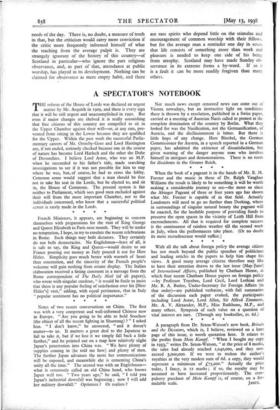A SPECTATOR'S NOTEBOOK
THE reform of the House of Lords was declared an urgent matter by Mr. Asquith in 1909, and there is every sign that it will be still urgent and unaccomplished in 199o. But even if major changes are shelved it is really astonishing that free citizens of this country are compelled to sit in the Upper Chamber against their will—or, at any rate, pre- vented from sitting in the Lower because they are qualified for the Upper. Within the past week the successful Parlia- mentary careers of Mr. Ormsby-Gore and Lord Hartington are, if not ended, seriously checked because one in the course of nature has become Lord Harlech and the other the Duke of Devonshire. I believe Lord Astor, who was an M.P. when he succeeded to his father's title, made searching investigations to see if it was not possible for him to stay where he was, but, of course, he had to cross the lobby. Common sense would suggest that a man should be free not to take his seat in the Lords, but be elected to, and sit in, the House of Commons. The present system is fair neither to Parliament, which sees good men excluded against their will from the more important Chamber, nor to the individuals concerned, who know that a successful political career is rarely made in the Lords.
* * * *














































 Previous page
Previous page